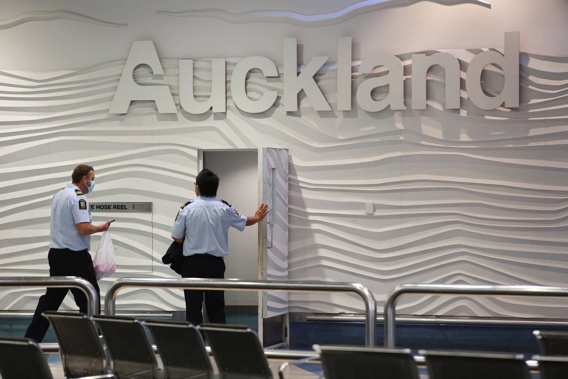
OMICRON LATEST
* 'Calculated and deliberate': Anti-mandate protester arrested at Tāmati Coffey's restaurant
* Relieved, hesitant and 'absolutely worn down': Reactions of Kiwis overseas to NZ border opening date
* The rapid Covid test the Ministry of Health originally turned down
* Anti-vax protesters spotted outside Christchurch schools
After nearly 700 days and more than 220,000 travellers passing through its doors, Prime Minister Jacinda Ardern says it's the beginning of the end for our MIQ system.
A phased reopening of the border introducing self-isolation for arrivals would start from February 28, first with vaccinated Kiwis coming from Australia and critical workers, Ardern said yesterday.
Two weeks later Kiwis from the rest of the world could arrive MIQ-free, followed by other travellers in phases from July through October.
Two years ago, 741,574 people arrived over January. Last month just over 15,000 people arrived - less than the quietest day pre-Covid.
That has been the impact of MIQ, which Ardern said had been a huge part of the country's Covid-19 response that had kept it free of the virus for long periods, with one of the lowest death rates in the world.
But it wasn't without its costs, including heartbreaking stories of Kiwis and migrant families separated from loved ones, and for businesses and critical services struggling without vital workers.
Ardern said yesterday it was time for a "new normal" and, with rising vaccine booster rates and Omicron creeping through the community - the seven-day average has nearly tripled in the past week to 113 cases - an end to the need for MIQ as it has stood.
A Covid-19 modeller warns as the border reopens hundreds - if not thousands - of new cases will likely arrive daily. Currently, just under 10 per cent of all arrivals are infected with the virus.
However, with the community outbreak rapidly growing and likely to be in the thousands of cases daily when reopening begins at the end of the month, border cases will make less of an impact, Professor Michael Plank says.
Plank says with about 50 cases a day at the border that could quickly ramp up to 500 as arrivals increased.
Herald analysis of data from Customs and the Ministry of Health shows on average over seven days to February 2, 49 cases a day were detected at the border among 584 daily arrivals.
This meant 8.4 per cent of arrivals carried Covid-19, likely the highly infectious Omicron variant.
This proportion has risen rapidly, with border case numbers in the single digits in December and now nearly doubling from just over two weeks ago, despite similar arrival numbers.
"That is a very high percentage we are seeing at the border, but just reflects the massive number of cases we are seeing around the world," Plank said.
It would be expected as new arrivals increased so too would case numbers.
However, once the local outbreak took off these cases would make less of a relative difference, and the staged reopening also mitigated this risk, Plank said.
"The timeframe for the first reopening step on February 27 looks reasonable.
"By that time, it is likely daily case numbers will be in the thousands and the vast majority of vaccinated adults will be eligible for their booster.
"Self-isolation and testing requirements for arrivals will dampen the effect of border cases on community transmission, while removing the bottleneck of MIQ and allowing us to monitor for possible new variants."
Plank said high booster coverage was crucial to avoid overloading the healthcare system.
Te Pūnaha Matatini principal investigator Dr Emily Harvey said the testing requirements - a rapid antigen test on days 0/1 and 5/6 - in the new self-isolation system was also likely to miss a large number of infections.
Arrivals should use RATs daily, or at least every two days, and a more rigorous PCR test in case of any symptoms, she said.
National Party leader Christopher Luxon welcomed the border news, calling it a "good day for New Zealand".
National had been calling for an end to MIQ, which it dubbed a "lottery of human misery", since last year, although it backed the Government's delayed reopening because of Omicron.
Luxon said this was not about party politics but "the people of New Zealand".
"It is a positive thing and we are fully supportive.
"We all have family members overseas and it will be awesome to be able to reconcile."
It was also important for bringing in critical workers, he said.
Act Party leader David Seymour said the plan still contained a "huge amount of restrictions", and had not come soon enough.
"Now, having failed to do that, we've got Covid and we're in the No Man's Land where we have half a border, Omicron's in the country, the economy can't keep going."
Green Party spokeswoman for Covid-19 Dr Elizabeth Kerekere said as the country began to reopen, the most vulnerable needed to be put first, including properly resourcing Māori and Pasifika health providers.
The Government also needed to provide adequate support for households to create self-isolation plans and prioritise immunocompromised people and people with underlying health issues, she said.
Te Pāti Māori co-leader Debbie Ngarewa-Packer said the decision had favoured business and commerce over people.
The general vaccine rollout last year had implicitly disadvantaged Māori because of its age prioritisation, and now Māori were again behind in getting booster shots and for tamariki.
Ngarewa-Packer, who has trained as a vaccinator and has been working in her rohe around South Taranaki for months, said those working hard on the ground would be the ones having to bear the brunt of the Government's decisions.
"These decisions were not made for our most vulnerable," she said.
There were 147 new community cases of Covid-19 reported yesterday, with the seven-day average now 113, nearly tripling from 41 a week ago.
Take your Radio, Podcasts and Music with you









